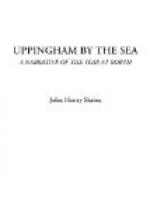My eyes run on with the tide which drifts inland up the estuary, and, farther than vision can really follow, track the march of its glancing ripples, as they swim on past shoal and sand-dune and morass up to the dewy gates of the Spring, in among green-clad river meadows and crisp close-skirted woodlands which the salt breath of sea-winds restrains from a richer luxuriance, on past springing knolls plumed with dark firs, and dimpling valleys mellow with the contrasted gold of the oak’s young leafage. Above these, hills moulded on a grander scale heave up their broad shoulders to the sunlight, which is reflected in pale but tender hues of blue or violet or rose from their bare rock masses, or the slopes hardly less bare, which are swept by great winds, and browsed yet closer by climbing mountain sheep. At this and the other point the bosses of the hills are lighted with the sparkle of gorse-thickets, or dusky with heather not yet kindled into bloom. Lower down there are belts of woodland, fencing off the pastures which strew the lowest terraces of the mountains from the barren wastes above them, and these pastures are brightly flecked with patches of white-walled homesteads down to the brown edge of the marsh. And so, ridge after ridge, the hills enclose the scene in a half-circle, of which this breezy headland, our “specular mount,” is an extreme horn. But what the eye reposes on at last is the broad floor of marsh-land between mountain and sea. A broad smooth floor, which would be vacant and dull enough had not Nature taken thought to drape its formlessness the more lovingly and richly. She has unrolled on it a carpet of various and solemn-tinted stuffs, where pale breadths of rusted bents sometimes mellow into strips of verdurous pasture, sometimes deepen into belts of embrowned peat-beds, sometimes take a yellower barrenness in parched flats, still briny and unreclaimed, and shaggy with bristling reeds. It is a wilderness, but not unrelieved with here and there an oasis, where, like islands left high and dry in a deserted ocean bed, one and another rocky knoll lift up above the waste flats around them some acres of sweet grass, or a broad field of flowering mustard, shining with a splendour as of cloth of gold, and fringed with a loop or two of silver braid by the river winding at the base. There is animate life, too, sprinkled not stintedly over its surface, not only of visitant sea-fowl from the shore, or solitude- loving creatures native to the place—plover and duck and long-winged herons, but also of cattle and horses grazing on the cultivated edges of the marsh, which make us look for the homes of their human masters at no great distance. Why there they are, lying overlooked at our feet all the while, a straggle of lowly white-roofed dwellings clinging to the long pebble ridge like barnacles on a rock, breathing a thin smoke from their scattered chimneys, whence the blessed smell of peat-fires is wafted through the dry air to our nostrils. But one




